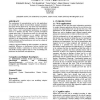Free Online Productivity Tools
i2Speak
i2Symbol
i2OCR
iTex2Img
iWeb2Print
iWeb2Shot
i2Type
iPdf2Split
iPdf2Merge
i2Bopomofo
i2Arabic
i2Style
i2Image
i2PDF
iLatex2Rtf
Sci2ools
130
click to vote
WWW
2006
ACM
2006
ACM
Reappraising cognitive styles in adaptive web applications
The mechanisms for personalisation used in web applications are currently the subject of much debate amongst researchers from many diverse subject areas. One of the most contemporary ideas for user modelling in web applications is that of cognitive styles, where a user's psychological preferences are assessed stored in a database and then used to provide personalised content and/or links. We describe user trials of a case study that utilises visual-verbal preferences in an adaptive web-based educational system (AWBES). Students in this trial were assessed by the Felder-Solomon Inventory of Learning Styles (ILS) instrument, and their preferences were used as a means of content personalisation. Contrary to previous findings by other researchers, we found no significant differences in performance between matched and mismatched students. Conclusions are drawn about the value and validity of using cognitive styles as a way of modelling user preferences in educational web applications....
Related Content
| Added | 22 Nov 2009 |
| Updated | 22 Nov 2009 |
| Type | Conference |
| Year | 2006 |
| Where | WWW |
| Authors | Adam Moore, Elizabeth J. Brown, Helen Ashman, Tim J. Brailsford, Tony Fisher |
Comments (0)

